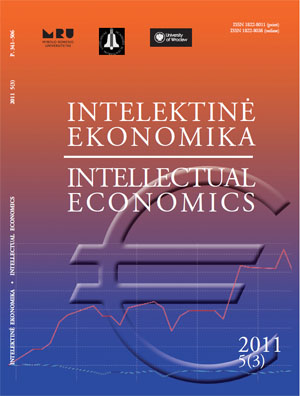Emerging of Market Economy in Lithuania (1990-2010)
Emerging of Market Economy in Lithuania (1990-2010)
Author(s): Algis Dobravolskas, Gediminas ČerniauskasSubject(s): Economy
Published by: Mykolas Romeris University
Keywords: transition to market economy; volatility of Lithuanian economy; national accounting; GDP
Summary/Abstract: Looking through international literature one can see that almost nobody doubts that Lithuania is advanced in terms of privatization, price liberalisation, opening of its economy. On the other hand, official statistical figures are providing indications that country is failing to assure stable economic development. The article provides a look into the complex developments of contemporary Lithuanian history (structural changes, such as decomposition of the shortage economy, effects of trade liberalization, inflated bubbles and the shadow economy) and is challenging methodology of national accounting as partially failing to reflect these developments. The evidence suggests that national accounts are likely underestimated Lithuanian gross domestic product (GDP) during the initial transition period of 1989-1994 and market formation period (1994-2003) while growth was exaggerated during the “boom” 2004-2007, and the fall was overestimated in the recession of 2008-2009. The main objective of the article is to assess the impact of certain transitional factors (e.g. shift from planned shortage economy to the liberal market economy with a mixture of official and shadow activities, opening of economy and cetera) to economic growth and methodology of national accounting. Regression analysis is used to quantify significance of convergence theory. Overview of the literature using Coub-Douglas function to asses potential output. Based on the modified income data, the annual potential growth during 2003-2010 is estimated to be around 5,3%.
Journal: Intelektinė ekonomika
- Issue Year: 5/2011
- Issue No: 3
- Page Range: 371-387
- Page Count: 17
- Language: English

